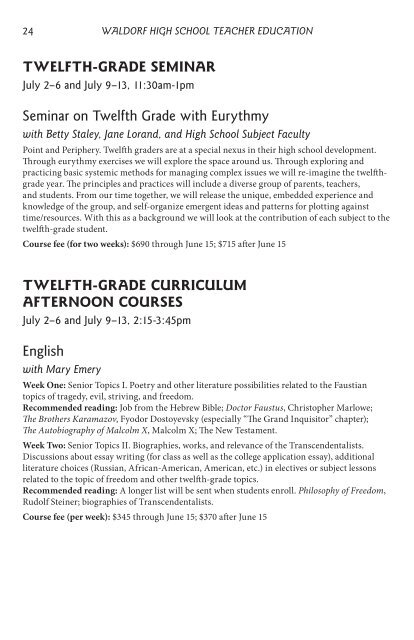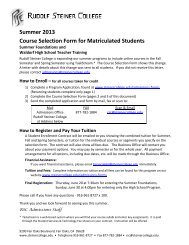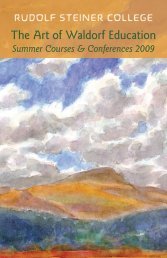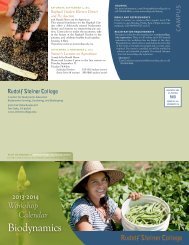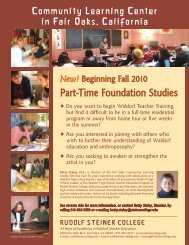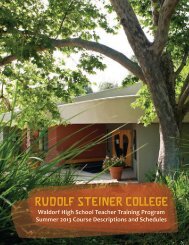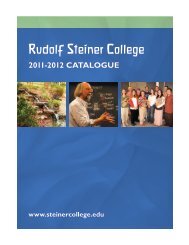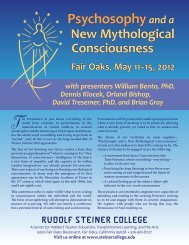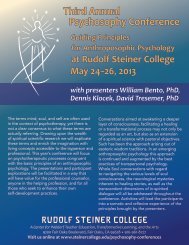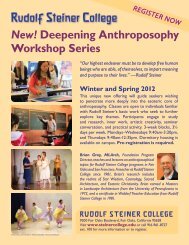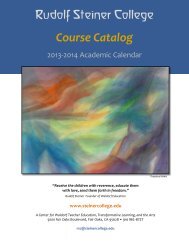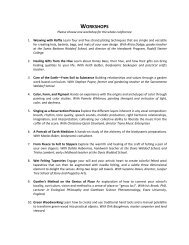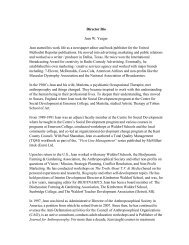The Art of Waldorf Education - Rudolf Steiner College
The Art of Waldorf Education - Rudolf Steiner College
The Art of Waldorf Education - Rudolf Steiner College
- No tags were found...
Create successful ePaper yourself
Turn your PDF publications into a flip-book with our unique Google optimized e-Paper software.
24 WALDORF HIGH SCHOOL TEACHER EDUCATIONWALDORF HIGH SCHOOL TEACHER EDUCATION25TWELFTH-GRADE SEMINARJuly 2–6 and July 9–13, 11:30am-1pmSeminar on Twelfth Grade with Eurythmywith Betty Staley, Jane Lorand, and High School Subject FacultyPoint and Periphery. Twelfth graders are at a special nexus in their high school development.Through eurythmy exercises we will explore the space around us. Through exploring andpracticing basic systemic methods for managing complex issues we will re-imagine the twelfthgradeyear. <strong>The</strong> principles and practices will include a diverse group <strong>of</strong> parents, teachers,and students. From our time together, we will release the unique, embedded experience andknowledge <strong>of</strong> the group, and self-organize emergent ideas and patterns for plotting againsttime/resources. With this as a background we will look at the contribution <strong>of</strong> each subject to thetwelfth-grade student.Course fee (for two weeks): $690 through June 15; $715 after June 15TWELFTH-GRADE CURRICULUMAFTERNOON COURSESJuly 2–6 and July 9–13, 2:15-3:45pmEnglishwith Mary EmeryWeek One: Senior Topics I. Poetry and other literature possibilities related to the Faustiantopics <strong>of</strong> tragedy, evil, striving, and freedom.Recommended reading: Job from the Hebrew Bible; Doctor Faustus, Christopher Marlowe;<strong>The</strong> Brothers Karamazov, Fyodor Dostoyevsky (especially “<strong>The</strong> Grand Inquisitor” chapter);<strong>The</strong> Autobiography <strong>of</strong> Malcolm X, Malcolm X; <strong>The</strong> New Testament.Week Two: Senior Topics II. Biographies, works, and relevance <strong>of</strong> the Transcendentalists.Discussions about essay writing (for class as well as the college application essay), additionalliterature choices (Russian, African-American, American, etc.) in electives or subject lessonsrelated to the topic <strong>of</strong> freedom and other twelfth-grade topics.Recommended reading: A longer list will be sent when students enroll. Philosophy <strong>of</strong> Freedom,<strong>Rudolf</strong> <strong>Steiner</strong>; biographies <strong>of</strong> Transcendentalists.Course fee (per week): $345 through June 15; $370 after June 15Historywith Betty StaleyWeek One: US History. <strong>The</strong> Great Migration and the changing face <strong>of</strong> America. A study <strong>of</strong> howthe migration <strong>of</strong> Blacks from the South from WWI through the 1970s had a major impact onAmerican life. We will compare this migration with migrations from across the sea. Using thisbook and other readings, we will examine how assignments shape a student’s thinking.Required reading: <strong>The</strong> Warmth <strong>of</strong> Other Suns: <strong>The</strong> Epic Story <strong>of</strong> America’s Great Migration,Isabel Wilkerson.Week Two: Symptomatology. <strong>The</strong> study <strong>of</strong> symptoms as an understanding <strong>of</strong> the evolution<strong>of</strong> consciousness—from the ancient world to modern life, from group consciousness to theindividual. This course provides a vantage point by which twelfth graders can explore contextand meaning in the great ideas and events that have shaped the past, influence the present, andstimulate imagination <strong>of</strong> the future. Using this as a background, teachers can address a variety<strong>of</strong> contemporary issues.Required reading: Colloquium on World History, AWSNA, May 2004.Course fee (per week): $345 through June 15; $370 after June 15Life Sciencewith Merrily LovellContinuation <strong>of</strong> morning course. (See page 21.)Course fee (for two weeks): $690 through June 15; $715 after June 15Chemistrywith John PeteringWe study phenomenology, the chemistry topics, and pedagogy for the twelfth-grade chemistryblock with the synthesis which guides the pedagogy <strong>of</strong> the twelfth-grade curriculum. Asbackground, we study selection, arrangement, and presentation <strong>of</strong> chemistry topics, usingseveral block outlines published in AWSNA’s Chemistry Colloquium, 2000. We will each developa design for a sample lesson and a lab experiment from a general list <strong>of</strong> biochemistry topics.Required reading: Chemistry Colloquium, AWSNA, 2000.Reference reading: Fundamentals <strong>of</strong> a Phenomenological Study <strong>of</strong> Chemistry, Chapters X-XI,Fritz Julius.Course fee (for two weeks): $690 through June 15; $715 after June 15Mathematicswith Ernst Schuberth, PhDThis course will provide an overview <strong>of</strong> 3-dimensional geometry from grade 6 through 12. Wewill start with clay modeling, construction <strong>of</strong> shadows, perspective black and white drawings,and continue with descriptive geometry in grades 9 and 10, projective and descriptive geometry(intersection <strong>of</strong> surfaces) in grade 11, and an outlook on using s<strong>of</strong>tware in grade 12.Course fee (for two weeks): $690 through June 15; $715 after June 15


